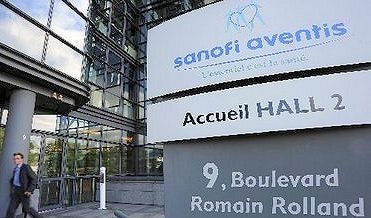Three and a half months after the firing of Chris Viehbacher, Sanofi has found its new general manager in Bayer, where Olivier Brandicourt heads the healthcare sector.
Published on 16/02/2015 – LE FIGARO.fr
End of suspense a Sanofi. Secondo quanto riferito, il gigante farmaceutico francese dovrebbe annunciare questa settimana il nome del suo nuovo CEO. Si tratta di Olivier Brandicourt, di cui Bloomberg ha evocato il nome venerdì scorso. L’attuale capo del ramo salute del gruppo tedesco Bayer ha prima fatto parte della “short list” dei leader del settore individuate dal Comitato Nomine di Sanofi, presieduto da Jean-René Fourtouand by the chairman of the board Serge Weinberg, who became CEO on an interim basis following the dismissal by the Board in late October 2014 of Chris Viehbacher. On February 5, Serge Weinberg promised that a new head will be appointed by the end of the quarter, thus stopping the rumors that indicated to resolve the operational command of the company, or to transform the corporate governance consultancy and directorate.
Diversified route
For the first time in the history of the French giant, the boss will be a doctor. Specialized in infectious and tropical diseases, intern at the Pitié-Salpêtrière in Paris, and also a biology graduate, Olivier Brandicourt has devoted himself extensively to the transmission of malaria. He practiced for two years in Brazzaville, capital of the current Republic of Congo, and in various clinics nationwide. In 1988, Olivier Brandicourt joined the US company Parke-Davis, later acquired by Pfizer, where he became medical director responsible for the development of an effective molecule for malaria. It then moves on to more conventional industrial and commercial paths. He moved to the United States, where he became marketing director responsible in particular for the blockbuster drug lipitor contro il colesterolo, e successivamente assume ampie responsabilità all’interno del gigante farmaceutico statunitense.
Dal 2013, questo padre di tre figli è Amministratore Delegato di Bayer Healthcare, una divisione che rappresenta la prima attività del gigante tedesco della chimica e della farmacia. Il gruppo con sede a Leverkusen realizza un fatturato di 19 € miliardi nel farmaco, nell’assistenza sanitaria dei consumatori e nei prodotti veterinari. L’anno scorso, era lui in particolare che aveva negoziato l’acquisizione da parte di Bayer della divisione OTC (farmaci senza ricetta) del gruppo Merck per più di 14 miliardi dollari. Una transazione abilmente assortita di una collaborazione in corso tra i due gruppi in oncologia. Questo successo non è sfuggito a Sanofi, che ha pensato a lui per aver affrontato questa operazione.
Sanofi, new products to support growth
The list of drugs awaiting approval promises to boost sales in the coming years as well. On the other hand, cutting operating costs will guarantee the improvement of profit margins. The security is trading at a discount to our fair value.
Francesco Lavecchia 17/02/2015 – MORNINGSTAR
The fourth quarter data confirm the positive growth prospects of Sanofi, but the stock continues to trade at a discount to our fair value of $55 (per ADR listed on the NYSE in New York).
Turnover rose by 5.7% compared to the same period last year (+11.4% at constant exchange rates) thanks to the excellent performance achieved by the vaccines and treatments against diabetes segment which, together, account for around a third of turnover overall of the group. The sales trend in emerging markets was also very good, where the quarter ended with a +7.9%.
Sanofi has a robust product portfolio. Many of these intervene on diseases that currently have no cure or are innovative drugs. This allows the pharmaceutical company to maintain high selling prices and therefore to guarantee itself significant profit margins (as evidenced by the Gross margin slightly lower than the 70%). The expiration of the patent rights for the production of Lantus (diabetes drug) will increase competition from generics, but only in the short term, as the upcoming approval of Toujeo (next generation drug) should be able to revive sales and the profits of this segment.
Analyst forecasts
Sanofi can boast a substantial list of products in the last stage of approval by the supervisory authorities which should help complete its offer and replace those with expiring patents. In particular, Praluent (a drug against cholesterol, whose launch is expected in the third quarter of 2015) and new vaccines. The latter, although they guarantee lower profit margins, undoubtedly represent one of the main sources of growth for the group. Sanofi is, in fact, very well positioned in emerging markets, where the demand for these medicines cannot be fully satisfied by the manufacturers' supply.
Our analysts assume an average growth of around 4% for the next ten years, supported by the good performance of drugs about to debut, the pet care business and emerging markets. Furthermore, the reduction in operating costs should allow the group to improve the operating margin from the current 20% to 25% in 2018.
– See more at: http://www.morningstar.it/it/news/134504/sanofi-nuovi-prodotti-per-sostenere-la-crescita.aspx#sthash.BaKOZxQL.dpuf
